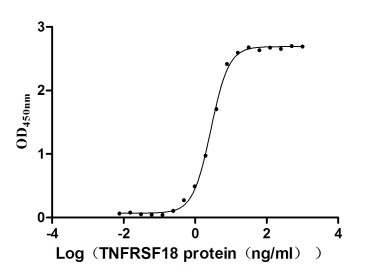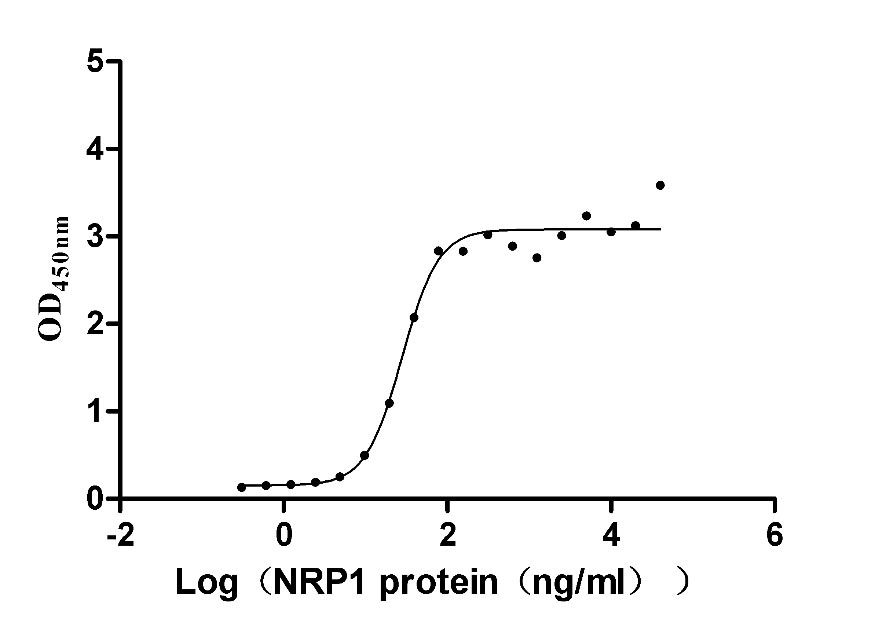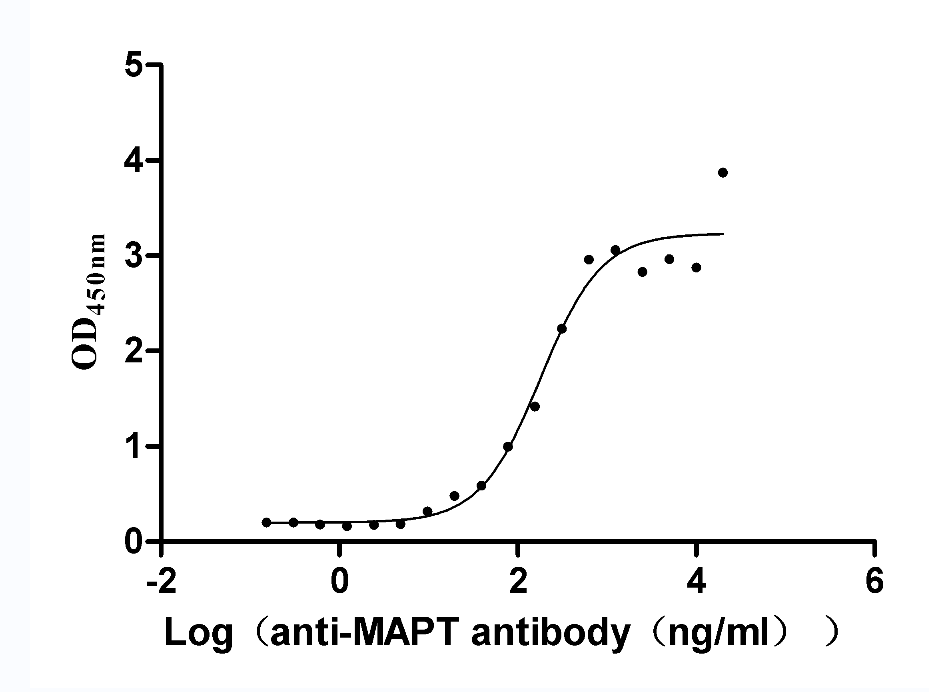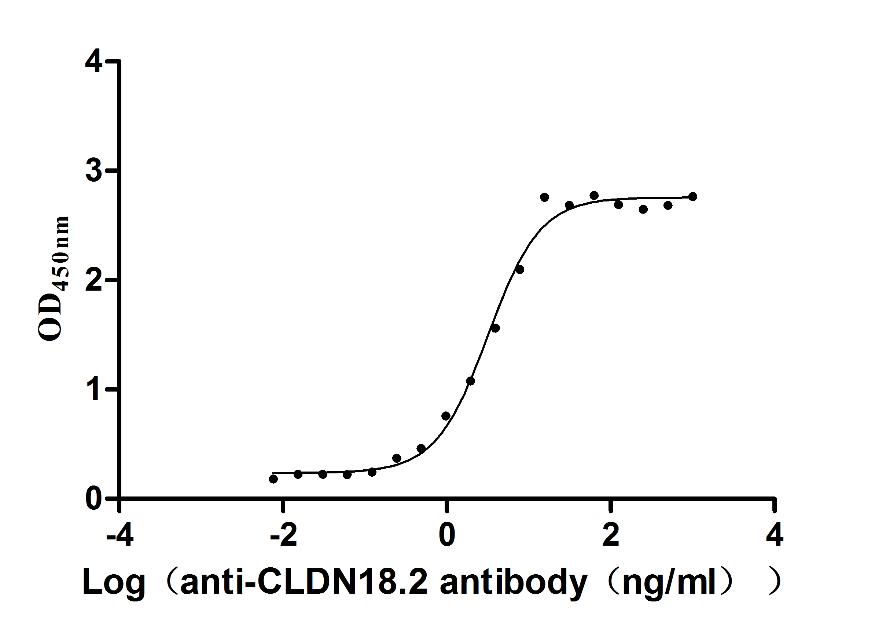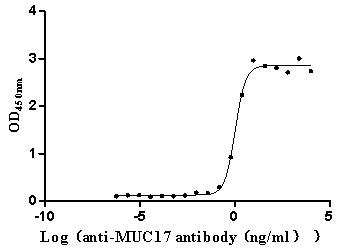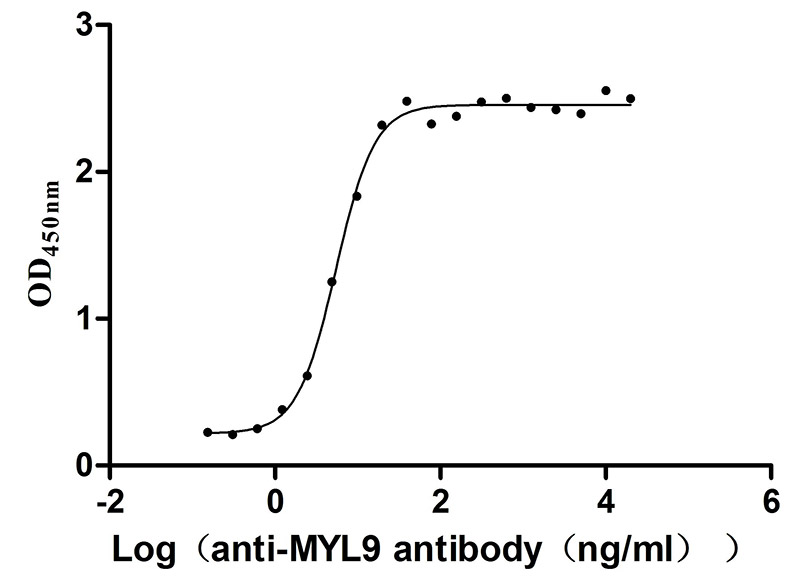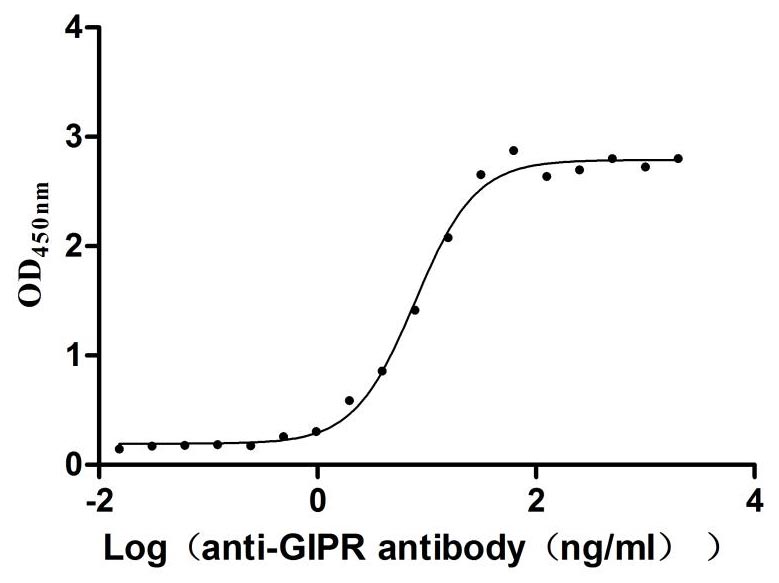Recombinant Human G protein-coupled receptor kinase 5 (GRK5)
-
货号:CSB-YP009926HU
-
规格:
-
来源:Yeast
-
其他:
-
货号:CSB-EP009926HU
-
规格:
-
来源:E.coli
-
其他:
-
货号:CSB-EP009926HU-B
-
规格:
-
来源:E.coli
-
共轭:Avi-tag Biotinylated
E. coli biotin ligase (BirA) is highly specific in covalently attaching biotin to the 15 amino acid AviTag peptide. This recombinant protein was biotinylated in vivo by AviTag-BirA technology, which method is BriA catalyzes amide linkage between the biotin and the specific lysine of the AviTag.
-
其他:
-
货号:CSB-BP009926HU
-
规格:
-
来源:Baculovirus
-
其他:
-
货号:CSB-MP009926HU
-
规格:
-
来源:Mammalian cell
-
其他:
产品详情
-
纯度:>85% (SDS-PAGE)
-
基因名:
-
Uniprot No.:
-
别名:FLJ39780; FP2025; G protein coupled receptor kinase 5; G protein coupled receptor kinase GRK5; G protein-coupled receptor kinase 5; G protein-coupled receptor kinase GRK5; GPRK5; GRK-pan; GRK5; GRK5_HUMAN; Pan-GRK
-
种属:Homo sapiens (Human)
-
蛋白长度:Full length protein
-
表达区域:1-590
-
氨基酸序列MELENIVANT VLLKAREGGG GKRKGKSKKW KEILKFPHIS QCEDLRRTID RDYCSLCDKQ PIGRLLFRQF CETRPGLECY IQFLDSVAEY EVTPDEKLGE KGKEIMTKYL TPKSPVFIAQ VGQDLVSQTE EKLLQKPCKE LFSACAQSVH EYLRGEPFHE YLDSMFFDRF LQWKWLERQP VTKNTFRQYR VLGKGGFGEV CACQVRATGK MYACKRLEKK RIKKRKGESM ALNEKQILEK VNSQFVVNLA YAYETKDALC LVLTIMNGGD LKFHIYNMGN PGFEEERALF YAAEILCGLE DLHRENTVYR DLKPENILLD DYGHIRISDL GLAVKIPEGD LIRGRVGTVG YMAPEVLNNQ RYGLSPDYWG LGCLIYEMIE GQSPFRGRKE KVKREEVDRR VLETEEVYSH KFSEEAKSIC KMLLTKDAKQ RLGCQEEGAA EVKRHPFFRN MNFKRLEAGM LDPPFVPDPR AVYCKDVLDI EQFSTVKGVN LDHTDDDFYS KFSTGSVSIP WQNEMIETEC FKELNVFGPN GTLPPDLNRN HPPEPPKKGL LQRLFKRQHQ NNSKSSPSSK TSFNHHINSN HVSSNSTGSS
-
蛋白标签:Tag type will be determined during the manufacturing process.
The tag type will be determined during production process. If you have specified tag type, please tell us and we will develop the specified tag preferentially. -
产品提供形式:Lyophilized powder
Note: We will preferentially ship the format that we have in stock, however, if you have any special requirement for the format, please remark your requirement when placing the order, we will prepare according to your demand. -
复溶:We recommend that this vial be briefly centrifuged prior to opening to bring the contents to the bottom. Please reconstitute protein in deionized sterile water to a concentration of 0.1-1.0 mg/mL.We recommend to add 5-50% of glycerol (final concentration) and aliquot for long-term storage at -20℃/-80℃. Our default final concentration of glycerol is 50%. Customers could use it as reference.
-
储存条件:Store at -20°C/-80°C upon receipt, aliquoting is necessary for mutiple use. Avoid repeated freeze-thaw cycles.
-
保质期:The shelf life is related to many factors, storage state, buffer ingredients, storage temperature and the stability of the protein itself.
Generally, the shelf life of liquid form is 6 months at -20°C/-80°C. The shelf life of lyophilized form is 12 months at -20°C/-80°C. -
货期:Delivery time may differ from different purchasing way or location, please kindly consult your local distributors for specific delivery time.Note: All of our proteins are default shipped with normal blue ice packs, if you request to ship with dry ice, please communicate with us in advance and extra fees will be charged.
-
注意事项:Repeated freezing and thawing is not recommended. Store working aliquots at 4°C for up to one week.
-
Datasheet :Please contact us to get it.
相关产品
靶点详情
-
功能:Serine/threonine kinase that phosphorylates preferentially the activated forms of a variety of G-protein-coupled receptors (GPCRs). Such receptor phosphorylation initiates beta-arrestin-mediated receptor desensitization, internalization, and signaling events leading to their down-regulation. Phosphorylates a variety of GPCRs, including adrenergic receptors, muscarinic acetylcholine receptors (more specifically Gi-coupled M2/M4 subtypes), dopamine receptors and opioid receptors. In addition to GPCRs, also phosphorylates various substrates: Hsc70-interacting protein/ST13, TP53/p53, HDAC5, and arrestin-1/ARRB1. Phosphorylation of ARRB1 by GRK5 inhibits G-protein independent MAPK1/MAPK3 signaling downstream of 5HT4-receptors. Phosphorylation of HDAC5, a repressor of myocyte enhancer factor 2 (MEF2) leading to nuclear export of HDAC5 and allowing MEF2-mediated transcription. Phosphorylation of TP53/p53, a crucial tumor suppressor, inhibits TP53/p53-mediated apoptosis. Phosphorylation of ST13 regulates internalization of the chemokine receptor. Phosphorylates rhodopsin (RHO) (in vitro) and a non G-protein-coupled receptor, LRP6 during Wnt signaling (in vitro).
-
基因功能参考文献:
- There was no association of SNPs in ADRB1, GRK5 and BAG3 genes with Takotsubo cardiomyopathy. PMID: 29514624
- T2DM patients with genotypes CC and CT at GRK5 rs10886471 had a significant reduction in terms of fasting plasma glucose compared with those with genotype TT (p < .01). In addition, the carriers of genotypes CC and CT at GRK5 rs10886471 had higher differential values of postprandial serum insulin compared with genotype TT carriers (p < .05). PMID: 29663513
- Data indicate two moderately frequent variants in G protein-coupled receptor kinase 5 (GRK5) and seven very rare polymorphisms in patients with laterality defects (heterotaxy) that were associated with a congenital heart defect (CHD). PMID: 27618959
- demonstrate for the first time exosomal enrichment of G-protein-coupled receptor kinase (GRK) 5 and GRK6, both of which regulate Src and IGF-IR signaling and have been implicated in cancer. PMID: 27232975
- Data suggest that perturbation of interface formed between large lobe of kinase domain of GRK5 and the RHD (regulator of G protein signaling homology domain) leads to higher phosphorylation activity/activation of kinase activity. PMID: 28808053
- The role of GRK5 single nucleotide polymorphisms in postoperative atrial fibrillation susceptibility following coronary artery bypass grafting among Chinese population PMID: 26235218
- Candidate gene eQTL showed a trans-acting association between variants of G protein-coupled receptor kinase 5 gene, previously linked to altered BB response, and high expression of VOPP1. PMID: 26860460
- Further, we will also present potential therapeutic strategies (i.e. small molecule inhibition, gene therapy) that may have potential in combating the deleterious effects of GRK5 in heart failure. PMID: 26829117
- Suggest a common regulatory pattern for the beta(1)-AR/GRK5 which is independent of cellular type or pathology. PMID: 26248277
- We demonstrated that the SNPs and the related haplotypes of GRK5 could play a central role in predisposing Parkinson disease patients to cognitive impairment. PMID: 26614013
- ADORA2A and GRK5 gene variants may influence the etiology of malaria infection. PMID: 26066465
- A significant difference in the frequency of GRK5 polymorphism was found between Takotsubo cardiomyopathy patients and controls, supporting a genetic predisposition to this cardiac syndrome. PMID: 25010510
- Specific patterns of altered heart GRK5 gene expression were found in models of cardiac hypertrophy. PMID: 26515328
- This study sought to identify the distributed characteristics of these variant genotypes in Chinese population, and influence of GRK5 and ADRB1 polymorphisms on systolic heart failure morbidity. PMID: 25638254
- GRK5 is found in a partially closed state with its kinase domain C-tail forming novel interactions with nucleotide and the N-lobe. PMID: 26032409
- G protein-coupled receptor kinase 5 gene polymorphisms may have a role in postoperative atrial fibrillation after coronary artery bypass grafting in patients receiving beta-blockers PMID: 25049040
- These data suggest that increased GRK5 expression may contribute to the pathophysiology of schizophrenia. PMID: 25153362
- Results demonstrate crosstalk among WIP1, CXCR4 and GRK5, which may be important for the aggressive phenotype of a subclass of medulloblastomas in children. PMID: 24632620
- GRK5 dimerization is important for its plasma membrane localization and function. PMID: 24807909
- GRK5 intronic (CA)n polymorphisms associated with type 2 diabetes in Chinese Hainan Island. PMID: 24594703
- GRK5 regulates prostate cancer cell migration and invasion. GRK5 forms a complex with moesin, phosphorylates moesin principally on T66 residue, and regulates cellular distribution of moesin. PMID: 24755472
- genetic polymorophism is associated with plasma viscosity PMID: 24178511
- In the largest genotyped TC cohort in the literature, we have found no association of genetic variants in the ERalpha, beta1AR, beta2AR, or COMT genes, or with the previously implicated GRK5, with occurrence of the syndrome. PMID: 23794609
- we show, for the first time, that knocking down the expression of GRK5 decreased the proliferation rate of gliioblastoma stem cells in contrast to control. PMID: 23693024
- DNA-binding ability of GRK5 requires both the NLS and an N-terminal calmodulin (CaM)-binding site PMID: 23658733
- These data suggest cell type- and subcellular compartment-dependent differences in GRK/arrestin-mediated desensitization and signaling. PMID: 23139825
- A genome-wide association study identifies GRK5 and RASGRP1 as type 2 diabetes loci in Chinese Hans. PMID: 22961080
- GRK5 phosphorylates Ser-4 in nucleophosmin and regulates the sensitivity of cells to PLK1 inhibition. PMID: 22467873
- A reduced cortical concentration of GRK5 in schizophrenia (resembling that in aging) may result in altered G protein-dependent signaling, thus contributing to prefrontal deficits in schizophrenia. PMID: 21784156
- Increased GRK5 expression in the failing myocardium suggests a relevant role in human heart failure. PMID: 22196842
- GRK5 is localized in the centrosome and regulates microtubule nucleation and normal cell cycle progression. PMID: 22223642
- GRK5 is a transcriptional modifier of a subset of Galphaq-downregulated genes, acting in opposition to the pathological effects of Galphaq and normalizing levels of these transcripts. PMID: 21768220
- Hip has been identified as a novel substrate of GRK5 in vitro and in cells, and phosphorylation of Hip by GRK5 plays a role in modulating CXCR4 internalization PMID: 21728385
- GRK5 mediates cell growth suppression by TIG1A. Thus, TIG1 may participate in the downregulation of G-protein coupled signaling by upregulating GRK5 expression. PMID: 21575264
- GRK5 gene does not confer risk to sporadic Parkinson's disease in our sample from Southern Italy. PMID: 21184589
- The GRK5 Leu41 allele protects from adverse cardiovascular outcomes in treated hypertensives. PMID: 21127457
- Studies seem to indicate that mild, soluble, Beta-amyloid accumulation can lead to a reduced membrane (functional) and an elevated cytosolic GRK2/5. PMID: 20730384
- This study shows for the first time that GRK5 negatively regulates VEGF signaling in human coronary artery endothelial cells. PMID: 20443868
- GRK5 as a novel kinase of p53, as well as a negative regulator of p53-mediated signal transduction. PMID: 20124405
- it has been demonstrated that the GRK5 L41 variant causes a negative inotropic effect under conditions of acute catecholamine stimulationl8AAg PMID: 20023040
- GRK5 Gln41Leu polymorphism is not associated with sensitivity to beta(1)-adrenergic blockade in humans. PMID: 19842931
- This study uncovered previously unrecognized functionally important sites in the regulator of G-protein signaling homology domain of GRK5 kinase. PMID: 20038610
- Results identify GRK5/6 as novel kinases for the single transmembrane receptor LRP6 during Wnt signaling. PMID: 19801552
- Human substance P receptor undergoes agonist-dependent phosphorylation by G protein-coupled receptor kinase 5 in vitro. PMID: 12067742
- Data indicate that GRK5 does not regulate the sorting of human beta 2-adrenoceptors in the endocytic pathway. PMID: 14691047
- a group of hydrophobic amino acids within the membrane binding motif is critical to mediating the PM localization of GRK5 PMID: 14976207
- GRK5 has a DNA-binding nuclear localization sequence PMID: 15542828
- High expression was detected in septic neutrophils and control cells treated with cytokines plus LPS. PMID: 16849637
- Results show that GRK5 plays a distinctive role in the phosphorylation of the beta2AR. PMID: 18034461
- GRK5-Leu41 represents a gain-of-function polymorphism that evokes enhanced loss-of-function of beta2AR during persistent agonist exposure, and thus may contribute to beta-agonist variability in asthma treatment of African-Americans. PMID: 18622265
显示更多
收起更多
-
亚细胞定位:Cytoplasm. Nucleus. Cell membrane; Peripheral membrane protein. Note=Predominantly localized at the plasma membrane; targeted to the cell surface through the interaction with phospholipids. Nucleus localization is regulated in a GPCR and Ca(2+)/calmodulin-dependent fashion.
-
蛋白家族:Protein kinase superfamily, AGC Ser/Thr protein kinase family, GPRK subfamily
-
组织特异性:Highest levels in heart, placenta, lung > skeletal muscle > brain, liver, pancreas > kidney.
-
数据库链接:
HGNC: 4544
OMIM: 600870
KEGG: hsa:2869
STRING: 9606.ENSP00000376609
UniGene: Hs.524625
Most popular with customers
-
Recombinant Human Tumor necrosis factor receptor superfamily member 18 (TNFRSF18), partial (Active)
Express system: Mammalian cell
Species: Homo sapiens (Human)
-
Recombinant Human Neuropilin-1 (NRP1) (Active)
Express system: Mammalian cell
Species: Homo sapiens (Human)
-
Recombinant Rat Intestinal-type alkaline phosphatase 1 (Alpi) (Active)
Express system: Mammalian cell
Species: Rattus norvegicus (Rat)
-
Recombinant Rat Microtubule-associated protein tau (Mapt) (Active)
Express system: Mammalian cell
Species: Rattus norvegicus (Rat)
-
Recombinant Macaca fascicularis Claudin (CLDN18)-VLPs (Active)
Express system: Mammalian cell
Species: Macaca fascicularis (Crab-eating macaque) (Cynomolgus monkey)
-
Recombinant Human Mucin-17 (MUC17), partial (Active)
Express system: Mammalian cell
Species: Homo sapiens (Human)
-
Recombinant Human Myosin regulatory light polypeptide 9 (MYL9) (Active)
Express system: Yeast
Species: Homo sapiens (Human)
-
Recombinant Rat Gastric inhibitory polypeptide receptor (Gipr), partial (Active)
Express system: Mammalian cell
Species: Rattus norvegicus (Rat)


